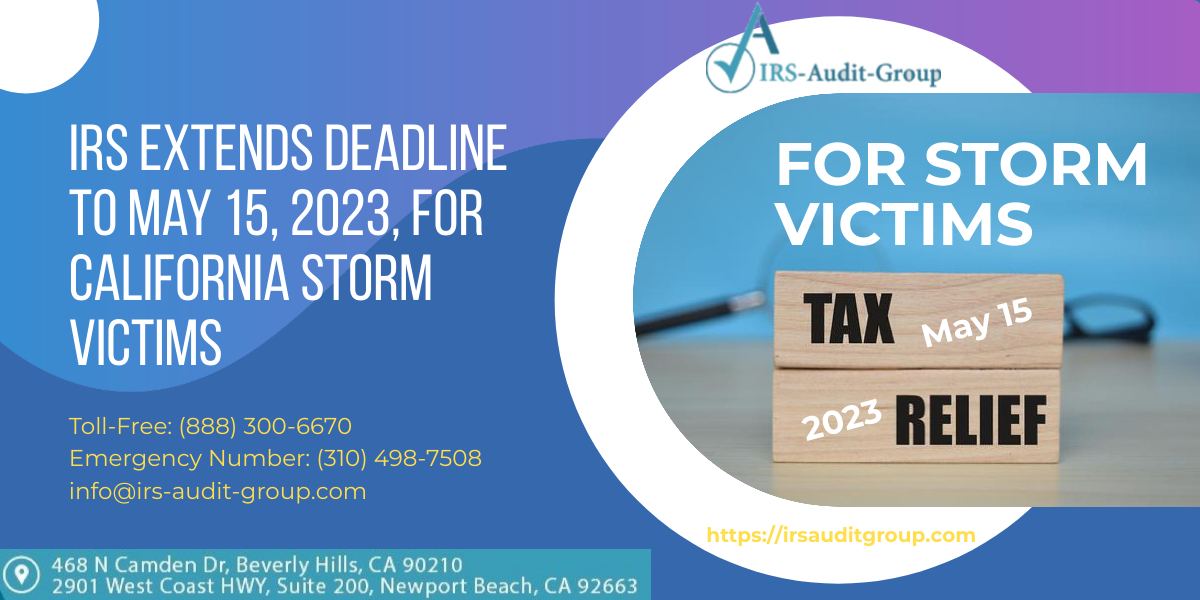IRS announces an extension of the deadline for filing tax returns to victims of severe winter storms, flooding, and mudslides in California beginning January 8, 2023. Taxpayers from the FEMA announced designated areas now have until May 15, 2023, to file for returns or request extensions.
Who is Eligible?
- Individuals who reside and businesses whose principal place of operations falls under these designated areas are eligible for such an extended deadline.
- Also, workers and volunteers affiliated with government-recognized organizations who assist the relief activities are also eligible, if they are injured or killed as a result of a disaster.
- Apart from the taxpayers within the affected areas, individuals and businesses not located in the IRS-designated disaster area can call the disaster assistance hotline at 1-866-562-5227, and explain their situation to the assistor. After self-identifying, telephone assistors will manually code the accounts for relief.
- Even individuals and businesses who suffered uninsured and unreimbursed disaster-related losses can choose to claim on the tax filing for 2022 or tax returns for 2023 (next year). Again, they should be eligible based on the FEMA-declared designated areas.
These eligible taxpayers will have until May 15 to make 2022 contributions to their IRAs and health savings accounts. They will not get penalties for failure to pay estimated tax installments as long as such payments are paid on or before May 15, 2023. Further to the new deadline, taxpayers can also make their fourth quarter estimated tax payments on May 15 normally due on January 17, 2023, and April 18, 2023.
What is Relief?
This relief helps taxpayers to claim a deduction for the disaster loss, additional time to file the tax returns for 2022 and waive penalties for late filing. Taxpayers with an IRS address of record located in the designated area will automatically receive such relief. Despite this, if they receive notice of late filing or late payment penalty, IRS advises calling the number on the notice to abate the penalty.
How to Apply?
While filing their returns, eligible taxpayers should notify the name of the disaster by writing it in blue or black ink at the top of the form. California Taxpayers can mention “California, severe winter storms, flooding, and mudslides” on top of their forms. If filing electronically, taxpayers should submit disaster information according to the software instructions. They can also seek certified tax professionals who will assist in reviewing the tax situation and help to file to ensure accuracy. In a few cases, the IRS may contact the affected taxpayers for collection and examination of the matter. They are obligated to explain how the disaster impacts them so that the IRS can provide appropriate consideration to their case. Therefore, engaging a tax professional is advisable to avoid an IRS audit notice later.
Additional information and instructions are provided in this FTB publication on the procedure to claim the tax deductions. Further California’s Franchise Tax Board (FTB) has detailed explanations of disaster types, application instructions, and claiming procedures in this link to help taxpayers and businesses. IRS also recommends that taxpayers visit the FAQ section for disaster victims before applying under the tax circumstances for accurate filing.
IRS Audit Group is a tax audit representation firm in Los Angeles, California. Usually, in a few cases, the IRS may ask for more information to validate the tax return filings. But rarely, IRS may like to audit your tax information through a letter of notice via Mail. In such cases, it is important to engage a tax professional like ours to represent your audit. Our licensed professionals comprise qualified CPAs and IRS Enrolled Agents. They can analyze your tax situation and help alleviate your burden. Please contact us for more information. https://irsauditgroup.com/contact/
Telephone Number: (310) 498-7508
info@irs-audit-group.com

